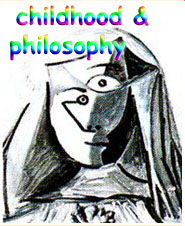rethinking consensus in the community of philosophical inquiry: a research agenda
DOI:
https://doi.org/10.12957/childphilo.2019.42559Keywords:
deliberative democracy, democratic education, youth participation, Philosophy for ChildrenAbstract
In Philosophy for Children (P4C), consensus-making is often regarded as something that needs to be avoided. P4C scholars believe that consensus-making would dismiss P4C’s ideals, such as freedom, inclusiveness, and diversity. This paper aims to counteract such assumptions, arguing that P4C scholars tend to focus on a narrow, or universal, concept of “consensus” and dismiss various forms of consensus, especially what Niemeyer and Dryzek (2007) call meta-consensus. Meta-consensus does not search for universal consensus, but focuses on the process by which people achieve various non-universal forms of consensus, such as agreement on the value of opponents’ normative view or agreement on the degree to which they accept opponents’ view. This paper argues that such meta-consensus is a key part of what Clinton Golding (2009) calls “philosophical progress,” which is the essential element that makes inquiry philosophical. In other words, without meta-consensus and philosophical progress, inquiry ends in merely conversation or antagonistic talk. Drawing on the example of P4C conducted with Japanese students, this paper shows how meta-consensus is achieved in the community of philosophical inquiry and how it contributes to make inquiry philosophical.
Downloads
References
BIESTA, G. Leaning democracy in school and society. Rotterdam: Sense Publishers, 2011.
BURGH, G. Democratic pedagogy. Journal of Philosophy in Schools. 1(1), 22-45, 2014.
BURGH, G., FIELD, T., & FREAKLEY, M. Ethics and the community of inquiry: Education for deliberative democracy. Cengage Learning Australia, 2006.
CASSIDY, C., MARWICK, H., DEENEY, L., & MCLEAN, G. Philosophy with children, self-regulation and engaged participation for children with emotional-behavioural and social communication needs. Emotional and Behavioural Difficulties, 23 (1), 81-96, 2018.
COHEN, J. Deliberation and democratic legitimacy. In J. BOHMAN & W.
REHG. (Eds.) Deliberative democracy: Essays on reason and politics. Massachusetts: The MIT Press, 1997.
DUNLOP, L. P4C in science education. In B. ANDERSON. (Ed) Philosophy for children: Theories and praxis in teacher education (pp. 72-81). London: Routledge, 2017.
GARDNER, S. Inquiry is no mere conversation (or discussion or dialogue): Facilitation of inquiry is hard work! Analytic Teaching, 16 (2), 102-111, 1996.
GOLDING, C. That’s a better idea! Philosophical progress and Philosophy for Children. Childhood and Philosophy. 5 (10), 223-269, 2009.
GOLDING, C. We made progress: Collective epistemic progress in dialogue without consensus. Journal of Philosophy of Education, 47 (3), 423-440, 2013.
HABERMAS, J. The theory of communicative action Vol1: Reason and the rationalization of society. T. McCarthy (trans.). Boston: Beacon, 1984.
LIPMAN, M. Thinking in education. Cambridge: Cambridge University Press, 2003.
LO, J. C. Empowering young people through conflict and conciliation: Attending to the political and agonism in democratic education. Democracy & Education 25 (1), 1-9, 2017.
MAKAIAU, A. S. The philosophy for children Hawaii approach to deliberative pedagogy: A promising practice for preparing pre-service social studies teachers in the college of education. Analytic Teaching and Philosophical Praxis. 36 (1), 1-7, 2016.
NIEMEYER, S., & DRYZEK, J. S. The ends of deliberation: Meta-consensus and inter-subjective rationality as ideal outcomes. Swiss Political Science Review 13 (4), 497-526, 2007.
NISHIYAMA, K. Enabling children’s deliberation in deliberative systems: Schools as a mediating space. Journal of Youth Studies. 22 (4), 473-488, 2018.
RAWLS, J. Political liberalism. New York: Columbia University Press, 1996.
RUITENBERG, C. W. Educating political adversaries: Chantal Mouffe and radical democratic citizenship education. Studies in Philosophy & Education, 28 (3), 269-281, 2009.
SAMUELSSON, M. Education for deliberative democracy: A typology of classroom discussions. Democracy and Education, 24(1), 1-9, 2016.
SAMUELSSON, M. Education for deliberative democracy and the aim of consensus. Democracy & Education, 26 (1), 1-9, 2018.
ŠIMENC, M. Citizenship education, philosophy for children, and the issue of participation. Journal of Contemporary Education Studies. 5, 10-26, 2009.
TODD, S. Living in a dissonant world: Toward an agonistic cosmopolitics for education. Studies in Philosophy & Education. 29, 213-228, 2010.
TSUCHIYA, Y. Philosophy for Children as education for reasonable thinkers: From the perspective of intellectual virtue education. Ph.D. dissertation submitted to Rikkyo University in Japan, 2018 [written in Japanese]



